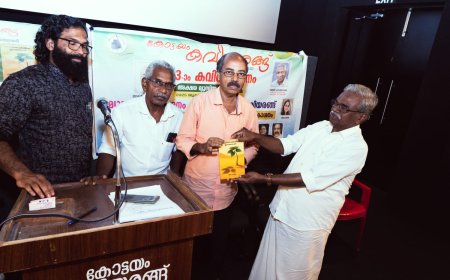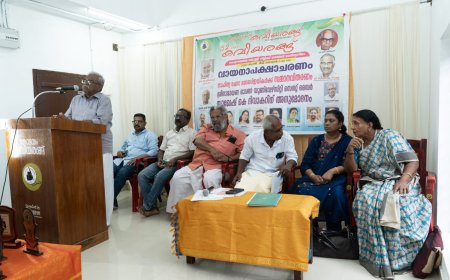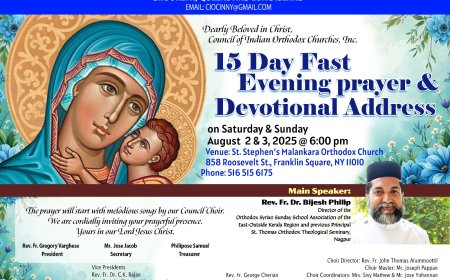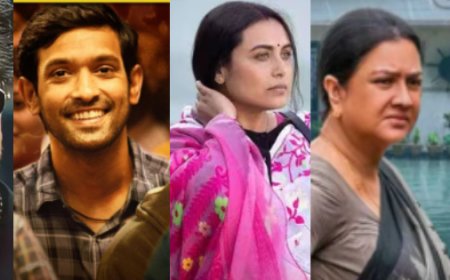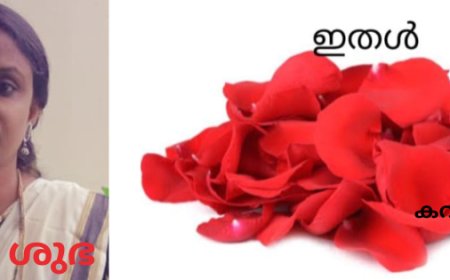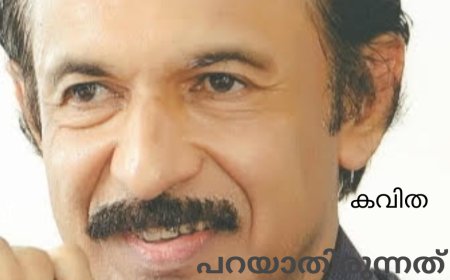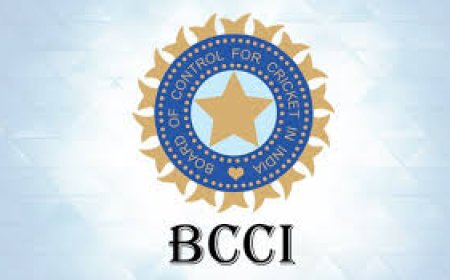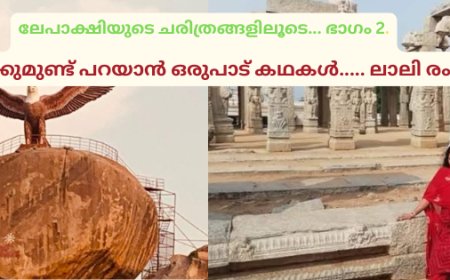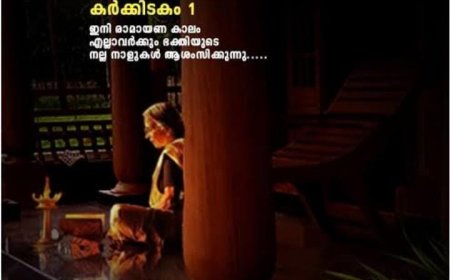Ram C/O Anandhi: Kendra Sahitya Akademy award for popular Malayalam novel starts a row
The arrival of a young man, loaded with heavy bags, into the midst of men defecating by the rail tracks of Chennai forms the opening of Akhil P Dharmajan’s Ram C/O Anandhi. The book follows the life of Sri Ram, who comes to Chennai with dreams of cinema. The language – direct, conversational, and, in the words of the author, cinematic – drew in tens of thousands of young readers. Ram C/O Anandhi became a bestseller that broke records in Malayalam literature. Two days ago, it also won an award for Akhil – the Yuva Purasakar recognition of Kendra Sahitya Akademy – news that did not go down well with sections of the literary crowd. The book, the third by 32-year-old Akhil, picked up sales two years after its publication in 2020, going viral across the internet, propelled by social media campaigns. His rise to fame is similar to that of Colleen Hoover, the American writer who, like Akhil, had self-published her early works, and grew over the internet into a sensation. Akhil’s novel was picked up by DC Books and sold in lakhs. Even as the book’s 54th edition was released, opinions favouring as well as dismissing his popularity began to appear. However, it is the Yuva Purasakar award that kicked up a storm. Writer Indu Menon, an earlier recipient of the Yuva Puraskar award, wrote a scathing note on her social media page, saying that these were the times of pulp fiction, and there was no place for literary fiction. She went on to add that one might next expect the award to go to a writer of Muthuchippi, an adult magazine in Malayalam. In an interview, Akhil responded to the criticism by calling the award an acceptance of popular fiction, of what the public liked. While he accepted that his book may not be to everyone’s liking, he was hurt by the language of the criticism, he said. Akhil also said he was appalled by some remarks insinuating that it was the name ‘Ram’ on the title of his book that favoured him for an award by the Union government, hinting at the Hindutva interests of the ruling Bharatiya Janata Party. His book and his character have little to do with politics or religious ideologies, Akhil clarified. But he would not react angrily to the comments, he added, and instead would work on becoming a better writer. He also thanked writers like Priya AS, Benyamin, and GR Indugopan who were encouraging and helpful with their tips and comments. Other writers and critics are divided in their opinion on a literary award going to a work of popular fiction. However, most of them draw the line at personal attacks of their young contemporary, limiting their comments to the propriety of award criteria. “I am happy that a young writer is being read and sold so well, and that now an English translation is out. Another good thing that the book did was to bring a reading habit among many who had been distant to reading. However, the criteria for an award are different. You should be looking at the merit of the book, not how well it sells,” renowned writer M Mukundan told TNM. Akhil’s book owes its success to the marketing on social media, prompting more and more young readers to pick it up. The book has sold more in a year than a masterpiece like OV Vijayan’s Khasakkinte Ithihasam did in 55 years, Mukundan noted. According to him, the process of being a writer has changed now. He recounted how, in his early days, one’s job as the writer ended when one finished writing the book and handed it over to the publisher. “But now, you have to promote your book, get on social media, and make reels for it. Even an old fashioned writer like me is on Instagram now, to promote my books,” Mukundan said. But he is against the personal criticism that Akhil faces, calling it an act of jealousy. Mukundan said he agrees with the remarks made by writer Kalpetta Narayanan, who while admitting that the book is a financial success, clarified that it is not popularity that merits an award. “Good language, characters, originality, observation, and other qualities make a book great,” Kalpetta had said. Another senior writer, Chandramathi, told TNM that the whole controversy over the award was unnecessary. “I read the book out of curiosity on what the language of the new age is, and I liked it. Akhil has presented it authentically, beautifully, in his own style. Everyone has their individual styles. An award is a jury’s prerogative, it comes from the special interest of that particular jury. I have several times been flabbergasted by the announcements of some prestigious awards. Anyway, it only has validity for a year. Next year it will go to someone else.” Writer Ashokan Cheruvil called some of the criticism of Akhil's win elitist. Akhil's novel is an ordinary one, he said, and has a simple narrative that accommodates the structure and expression of post and pre modernism in Malayalam literature. "It does not have the apolitical, middle class, and feudal nostalgia seen in literature. But it has some significant topics such as the Sri La

THE arrival of a young man, loaded with heavy bags, into the midst of men defecating by the rail tracks of Chennai forms the opening of Akhil P Dharmajan’s Ram C/O Anandhi.
The book follows the life of Sri Ram, who comes to Chennai with dreams of cinema. The language – direct, conversational, and, in the words of the author, cinematic – drew in tens of thousands of young readers.
Ram C/O Anandhi became a bestseller that broke records in Malayalam literature. Two days ago, it also won an award for Akhil – the Yuva Purasakar recognition of Kendra Sahitya Akademy – news that did not go down well with sections of the literary crowd.
The book, the third by 32-year-old Akhil, picked up sales two years after its publication in 2020, going viral across the internet, propelled by social media campaigns.
His rise to fame is similar to that of Colleen Hoover, the American writer who, like Akhil, had self-published her early works, and grew over the internet into a sensation.
Akhil’s novel was picked up by DC Books and sold in lakhs.
Even as the book’s 54th edition was released, opinions favouring as well as dismissing his popularity began to appear. However, it is the Yuva Purasakar award that kicked up a storm.
Writer Indu Menon, an earlier recipient of the Yuva Puraskar award, wrote a scathing note on her social media page, saying that these were the times of pulp fiction, and there was no place for literary fiction.
She went on to add that one might next expect the award to go to a writer of Muthuchippi, an adult magazine in Malayalam.
In an interview, Akhil responded to the criticism by calling the award an acceptance of popular fiction, of what the public liked. While he accepted that his book may not be to everyone’s liking, he was hurt by the language of the criticism, he said.
Akhil also said he was appalled by some remarks insinuating that it was the name ‘Ram’ on the title of his book that favoured him for an award by the Union government, hinting at the Hindutva interests of the ruling Bharatiya Janata Party.
His book and his character have little to do with politics or religious ideologies, Akhil clarified.
But he would not react angrily to the comments, he added, and instead would work on becoming a better writer. He also thanked writers like Priya AS, Benyamin, and GR Indugopan who were encouraging and helpful with their tips and comments.
Other writers and critics are divided in their opinion on a literary award going to a work of popular fiction.
However, most of them draw the line at personal attacks of their young contemporary, limiting their comments to the propriety of award criteria.
“I am happy that a young writer is being read and sold so well, and that now an English translation is out. Another good thing that the book did was to bring a reading habit among many who had been distant to reading. However, the criteria for an award are different. You should be looking at the merit of the book, not how well it sells,” renowned writer M Mukundan told TNM.
Akhil’s book owes its success to the marketing on social media, prompting more and more young readers to pick it up. The book has sold more in a year than a masterpiece like OV Vijayan’s Khasakkinte Ithihasam did in 55 years, Mukundan noted.
According to him, the process of being a writer has changed now. He recounted how, in his early days, one’s job as the writer ended when one finished writing the book and handed it over to the publisher.
“But now, you have to promote your book, get on social media, and make reels for it. Even an old fashioned writer like me is on Instagram now, to promote my books,” Mukundan said.
But he is against the personal criticism that Akhil faces, calling it an act of jealousy. Mukundan said he agrees with the remarks made by writer Kalpetta Narayanan, who while admitting that the book is a financial success, clarified that it is not popularity that merits an award.
“Good language, characters, originality, observation, and other qualities make a book great,” Kalpetta had said.
Another senior writer, Chandramathi, told TNM that the whole controversy over the award was unnecessary.
“I read the book out of curiosity on what the language of the new age is, and I liked it. Akhil has presented it authentically, beautifully, in his own style. Everyone has their individual styles. An award is a jury’s prerogative, it comes from the special interest of that particular jury. I have several times been flabbergasted by the announcements of some prestigious awards. Anyway, it only has validity for a year. Next year it will go to someone else.”
Writer Ashokan Cheruvil called some of the criticism of Akhil's win elitist.
Akhil's novel is an ordinary one, he said, and has a simple narrative that accommodates the structure and expression of post and pre modernism in Malayalam literature.
"It does not have the apolitical, middle class, and feudal nostalgia seen in literature. But it has some significant topics such as the Sri Lankan refugee issue and the lives of transgender people,” he stated.
Critic Saradakutty also condemned the narrative that the book did not deserve the award. It needs only to be seen as something that makes the winner happy, she said.
"The merit of a creative work is not decided by an award, jealous writers, or critics. The truth of a work will be proven by time."




